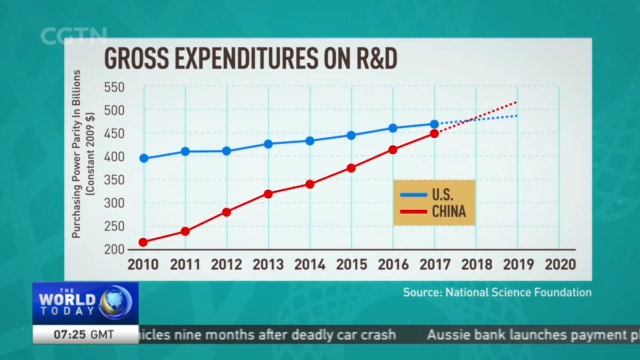
16:06, 21-Dec-2018
China Scientific Research: Advancements in 40 years of reform and opening up
Updated
15:42, 24-Dec-2018
02:37

China employs more than six million people in the field of science and research. And it ranks second worldwide in research funding. That research is paying off in terms of innovation. More than a million patent applications were made last year. CGTN's Jim Spellman looks at China's contributions to science.
Over the last four decades, China has become a scientific powerhouse.
HE LIN CHINESE ACADEMY OF SCIENCES "In the past 40 years of reform and opening up in China, we have shifted the role from tracking the development of science and technology to catching up and now even taking the lead."
China had only a bare-bones space program in 1978, but is now poised to make advancements that may benefit all of mankind.
SU LIANG CHINESE AEROSPACE SCIENCE & TECHNOLOGY CORP. "We hope that in the future our space station can be a research platform not just for China but also the world. We will build it as a national space lab."
Chinese investments in medical research are paying off.
PAN JIAOFENG CHINESE ACADEMY OF SCIENCES "We have yielded pleasing results in creating new medicines in recent years. For example, we have just passed the third phase of clinical test of medicine for Alzheimer's Disease. It will be world leading after receiving investment and being put into application."
"Hello everyone, I'm an English Artificial intelligence anchor."
And China has quickly become a leader in cutting-edge technologies like robotics and artificial intelligence.
According to the US Government's National Science Foundation, China spends more than 400 Billion Dollars a year on research and development-- second only to the United States. And it's on track to pass the U.S. in R & D spending by the end of this year.
Since 1978 more than five million Chinese pupils have studied abroad, and nearly half a million foreigners currently study in China. This opening up created a valuable two-way flow of information and knowledge.
Engineering is the most popular post-graduate field of study in China, which is already the world's largest producer of peer reviewed science and engineering articles. The country's emphasis on STEM fields is creating a highly educated workforce focused on innovation.
JASON LOW MARKET ANALYST "There's no shortage of innovation coming out, especially from China. Nowadays Chinese companies large or small they are all focused on innovation."
JIM SPELLMAN WASHINGTON "In centuries past China was a scientific force- credited with inventing paper, gunpowder, the compass- even the umbrella. And now, after 40 years of reform and opening up, China has once again taken a leading role in science and technology."

SITEMAP
Copyright © 2018 CGTN. Beijing ICP prepared NO.16065310-3
Copyright © 2018 CGTN. Beijing ICP prepared NO.16065310-3